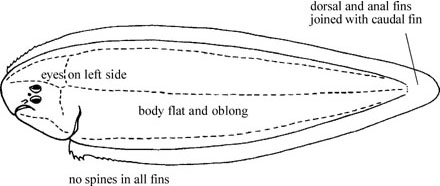CYNOGLOSSIDAE
Tonguefishes
By Keiichi Matsuura
 Cynoglossus cynoglossus |
|
|
Body tongue-shaped, strongly compressed, reaching to 40 cm. Eyes on left side of head. Mouth small, asymmetrical; reaching posteriorly below lower eye; rostral hook usually present below mouth. Teeth minute and usually only on blind side jaws. Posterior margin of preopercle strongly attached to opercle, without free margin and covered with skin and scales. Dorsal fin reaching far forward on head; dorsal and anal fins joined to caudal fin. Pectoral fins absent. Only the right side pelvic fin present. Scales small, cycloid or ctenoid. Color: variable even in a species; eyed side of body usually uniformly brown or gray, frequently covered with spots, blotches, or bands; most species uniformly whitish or yellowish on blind side.
Similar families occurring in the area. Bothidae, Citharidae, Paralichthyidae, Pleuronectidae, and Psettodidae: dorsal and anal fins separated from caudal fin and margin of preopecle free and distinct. Soleidae: eyes on right side of head and always with 2 pelvic fins. Remarks. Found on muddy bottoms and other substrates, from tidepools to deep waters on continental shelf and slopes. Marketed fresh, frozen, and also dried-salted. |

|
|